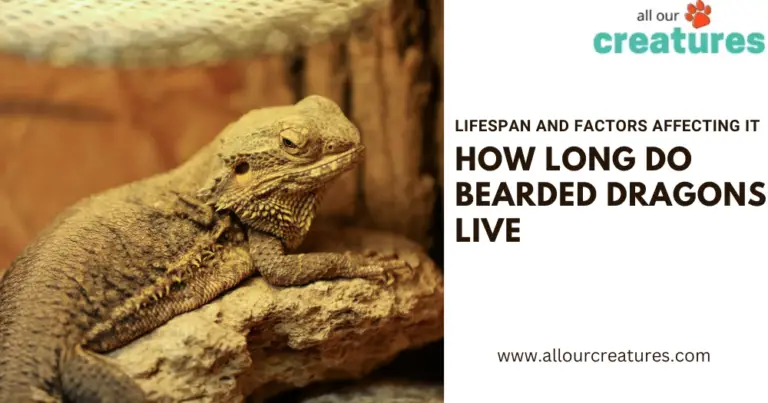What Not To Feed Bearded Dragons? [Must Read]
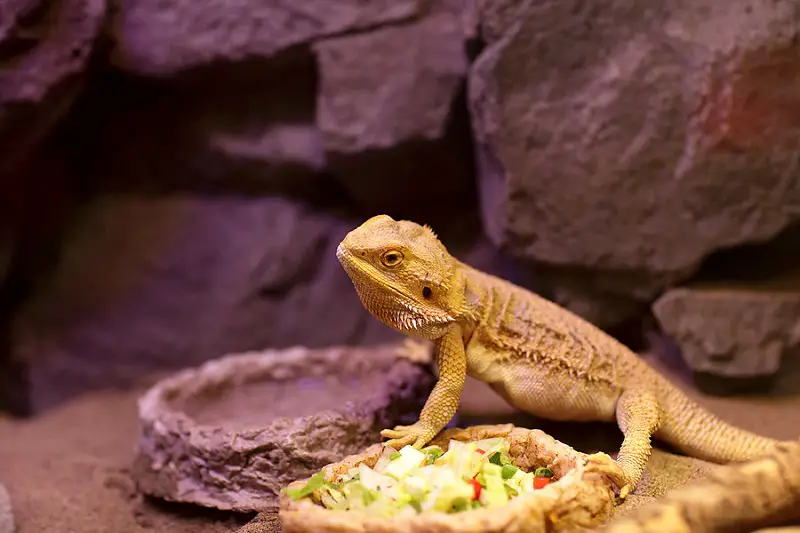
Bearded Dragons are a fun reptile to have around. They develop some of the best personalities, adding omething fun to your family. However, with proper care comes an appropriate diet. These reptiles can eat a lot of things, from vegetables and plants to live insects. However, some things are not safe for them to eat.

In this article, we’ll give a brief overview of the Bearded Dragon before diving into a list of what not to feed your Bearded Dragon. Then, we’ll share some food ideas that are safe for your reptile to eat.
Contents
Table of Contents
What Is A Bearded Dragon?
Anyone would be lucky to have a Bearded Dragon as a pet. They’re social, friendly, and are diurnal so that you can be with them during the day. In addition, they’re fairly low-maintenance to care for. For instance, Bearded Dragons, also affectionately known as Beardies, came from Australia. This is because they’re used to warmer temperatures. However, they were brought over to the United States in the early 1900s and are one of the most popular reptiles to have as a pet in the United Kingdom.
So, you’ll want to set up a terrarium that’s at least 40 gallons. To mimic their natural habitat, it should be about 75 to 85 degrees F during the day and about 68 to 74 degrees F at night.
In addition, Beardies love to sunbathe. So they’ll need a UV light that will allow them a basking spot during the day of about 100 degrees F.
With this proper habitat and a healthy diet, your Beardie can grow up to 24 inches long and be part of your family for up to 15 years.
Beardies can eat many things, but let’s talk about what not to feed a Bearded Dragon.
What Not To Feed Bearded Dragons? Watch this video:
What Not To Feed Bearded Dragons
Bearded Dragons are omnivores. This means that they can eat both plants and invertebrates. However, just because they do eat a wide variety of food doesn’t mean they should. Some foods are problematic for your Beardie to digest, make them sick or can be poisonous.
So, what foods can Bearded Dragons not eat? Let’s talk about it below.
What Vegetables Can Bearded Dragons Not Eat?
Chives
Chives are too acidic for Bearded Dragons to digest. Also, it contains compounds that aren’t healthy for reptiles to consume.
Eggplant
In addition, eggplants are also too acidic for Bearded Dragons to consume. The acidity can hurt their digestive system and make them sick.
Garlic
Garlic is similar to onions, chives, and leeks. However, the acidity is too high for your Beardie to eat, causing them to get sick if consumed in large quantities.
Leeks
Leeks are similar to onions and chives when it comes to acidity levels. It’s not healthy for your Bearded Dragon to consume, primarily since leeks are known to cause organ failure. It’s not known why, but it’s best to stay away from this veggie.
Lettuce
Lettuce isn’t the worst to feed your Beardie. However, it has little nutritional value, especially Iceberg lettuce. Also, it’s high in water content, which can lead to diarrhea, overhydration, and dehydration.
Onions
No matter if it’s raw or cooked, onions are never okay to feed your Beardie. They are acidic and contain compounds that are not healthy. As a result, your Bearded Dragons won’t be able to digest this food, making them sick.
Rhubarb
Rhubarb contains high amounts of oxalic acid, which is deadly to Bearded Dragons. Even in small quantities, this could make your reptile seriously sick, so it’s best not to risk it.
What Insects Can Bearded Dragons Not Eat?
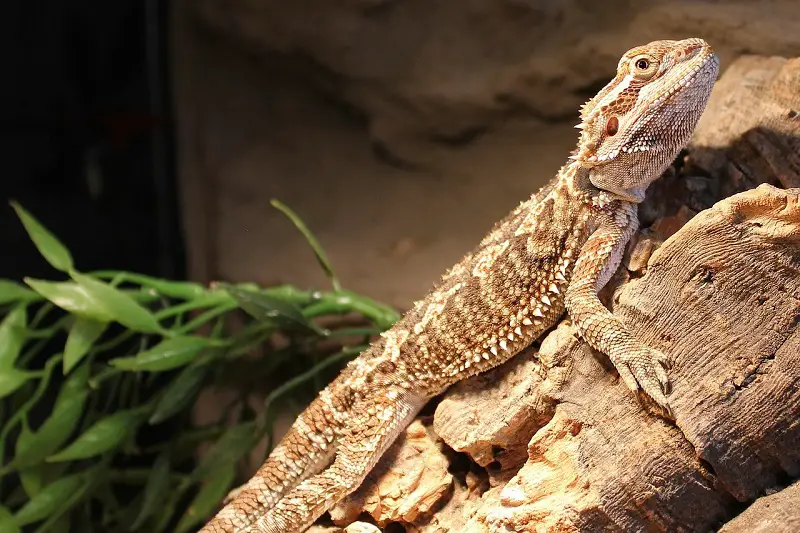
Box Elder Bugs
Box Elder bugs are toxic to Bearded Dragons. They are usually found in the wild and might be carrying parasites.
Caterpillars And Butterflies
Caterpillars and butterflies are technically harmless to Beardies. However, they eat most plants which could be toxic and deadly to Bearded Dragons. Even though they’re not directly eating the plant, eating these insects can pass toxins to your pet.
Fireflies
Fireflies are a big no-no. This bug contains a chemical that’s lethal to Bearded Dragons. It’s unknown what this chemical is, but it’s believed to be whatever causes fireflies to glow. So, stay away from fireflies and other glowing bugs.
Ladybugs
Ladybugs are toxic to Bearded Dragons as well since they’re only found in the wild. They have parasites and other toxins that will make your reptile sick. Sometimes, these bugs make their way into our homes, so it’s best to make sure they can’t get into your Beardie’s enclosure.
Venomous Insects
Insects that carry venoms such as scorpions, wasps, bees, centipedes, spiders, and others, can pass the venom onto your Bearded Dragon. Thus, poisoning them and potentially resulting in death.
Wild Insects
It sounds easier to catch bugs yourself to save yourself some money. However, wild insects may contain parasites that will transmit over to your Beardie. This could make them sick, so it’s best to buy insects from your local pet store.
What Not To Feed A Bearded Dragon – Fruits
Acidic Fruits
Fruits high in citruses, such as oranges, tomatoes, lemons, limes, and pineapple, should not be fed to your reptile. The acidity will be complex for your Beardie to digest, causing diarrhea.
Avocado
This fruit contains oxalic acid, which binds minerals your Bearded Dragons needs, such as calcium. Unfortunately, too much of this and your Beardie won’t get the nutrients they need. Thus, they’ll get sick and potentially resulting in death.
Can Bearded Dragons eat strawberries? Find out more here.
What Can Bearded Dragon Not Eat – Everything Else
Beef, Chicken, And Fish
Even though Bearded Dragons are omnivores, meat and fish are too high in fat and phosphorous. This can make your Beardie sick, especially in large amounts.
Dairy Products
Bearded Dragons need a lot of calcium in their diet. However, feeding them yogurt, cheese, or milk is not the way to do it. Beardies don’t produce the enzymes needed to break down these dairy products, thus getting sick.
Mushrooms
Mushrooms are high in acid and phosphorous. Beardies need more calcium than phosphorous, so eating mushrooms can be highly toxic to them. Not all mushrooms are the same, but it’s best to stay away from these fungi altogether.
What Do Bearded Dragons Eat?
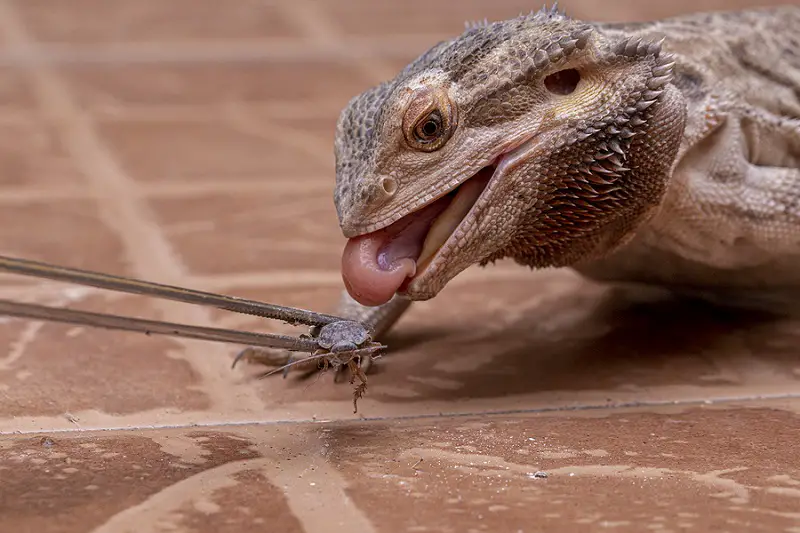
Overall, the best food for Bearded Dragons is certain vegetables and invertebrates. Since Beardies need a high calcium diet, they’ll need foods that give them more calcium than phosphorous. Also, they need food that’s easy for them to digest.
Wild Bearded Dragons eat about 75% of animals. They’ll eat plants and other vegetables to make up the additional 25%.
On the other hand, your pet Beardie will need about 40% live food and 60% greens when they’re older. Young Bearded Dragons need to eat about 65% live food and 35% greens.
For example, some vegetables, or leafy greens, that are safe for your reptile to eat might be as follows:
- Butternut squash
- Chicory
- Clover
- Dandelion
- Plantain leaves
- Rocket
- Watercress
In addition, you can feed your Beardie live insects, such as:
- Calciworms
- Cockroaches
- Crickets
- Earthworms
- Kingworms
- Locusts
- Mealworms
To learn exactly how many mealworms to feed a bearded dragon, read our full article here.
Finally, there are some fruits that your Bearded Dragon will be able to eat, even though fruits should be given to them sparingly.
For example, Beardies can eat certain fruits such as watermelon, figs, apples, pears, blueberries, and more.
To know all the best fruits bearded dragons can eat, read this full guide here.
No matter what you end up feeding your Bearded Dragon, make sure that’s it adequately prepared for them. This includes washing the food and cutting it up into smaller pieces. Then, your Bearded Dragon will have an easier time grabbing the food with its tongue and consuming it.
Also, Bearded Dragons are known to be picky eaters. Once they find something they like, they’ll stick to that one food, which is another reason to prepare it in smaller pieces.
For instance, you can chop veggies and plants together into small pieces, mixing them. Think of it as giving your reptile a salad. So even if your reptile wants only one thing, they’ll get some of the flavors from everything else.
Remember, your Bearded Dragon needs a diet that’s rich in calcium. So, in addition to leafy greens and live food, talk to your vet about getting calcium supplements if needed.
Conclusion
So, what can a Bearded Dragon not eat? Believe it or not, there are more items on that list than you’d think. But it’s always best to be safe than sorry.
If there’s a food you want to try with your Beardie, be sure to talk about it with their vet first. Otherwise, it’s fun to try new things with your reptile.
Find our guide to whether bearded dragons can eat kale, strawberries, grapes or all the best fruits for bearded dragons. Also read our full article to know exactly what baby bearded dragons can eat or learn more about bearded dragons here.

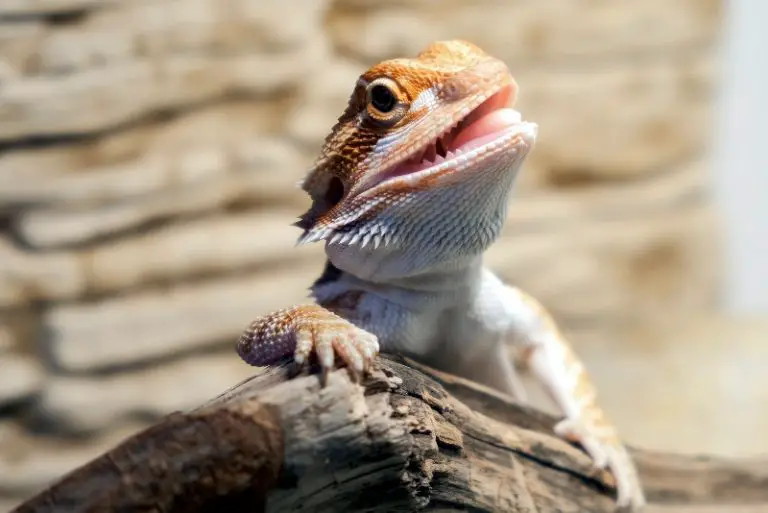
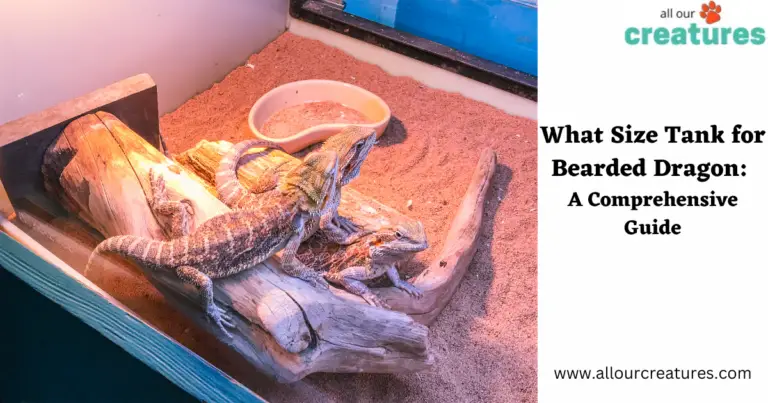
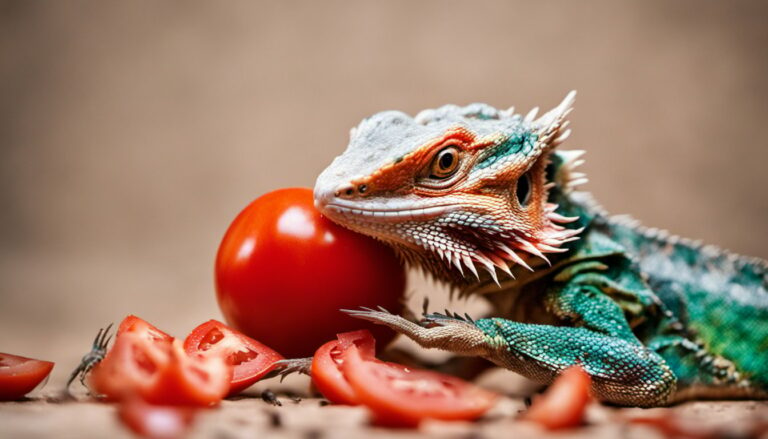
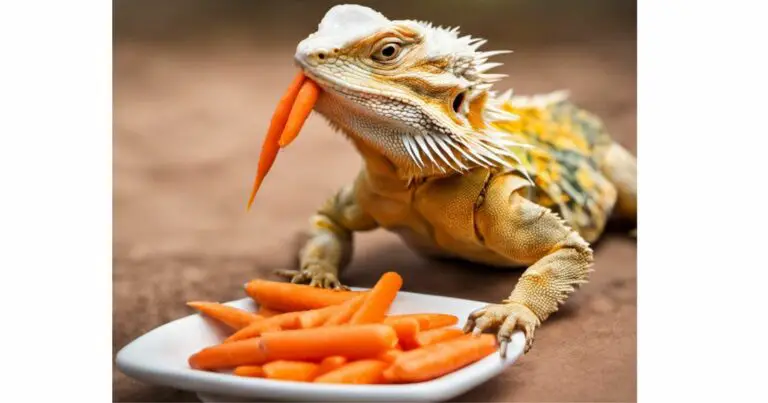
![What Do Bearded Dragons Do For Fun? [Activities & Toys]](https://allourcreatures.com/wp-content/uploads/2021/10/bearded-dragon-1-768x514.jpg)
